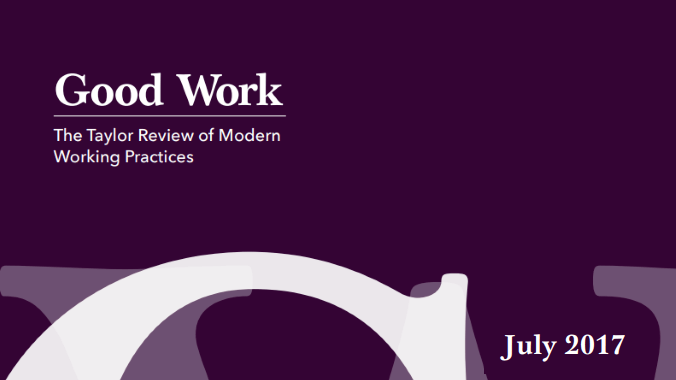May gives go ahead for ‘gig’ economy reforms
Prime Minister Theresa May has backed reforms to employment law based on Matthew Taylor’s review into the so-called “gig” economy.

The Guardian has reported that the government plans to:
- Close the Swedish Derogation – a legal loophole that allows agency workers to be paid less per hour than their permanent colleagues;
- Provide “gig” workers with the right to request temporary or fixed-hour contracts after 12 months of continuous service;
- Tackle the definition of continuous service to fit modern ways of working, in which people may not receive regular hours;
- Consider implementing appropriate notice periods and compensation for cancelled shifts;
- Clarify the criteria that determines whether people are “workers” or “independent contractors” by aligning tax and employment laws;
- Name and shame employers that fail to pay out compensation ordered by employment tribunals after they have breached workers’ rights;
- Introduce fines for companies that break agency worker regulations by failing to provide holiday and sick pay
- Introduce a right to a payslip for all workers;
- Launch an investigation into worker exploitation at hand car washes, which have found to be disproportionately involved in modern slavery and other illegal employment practices;
- Consider setting up a labour market enforcement agency, which would encompass the Gangmasters and Labour Abuse Authority, the Employment Agency Standards Inspectorate and the relevant areas of the HMRC.
As the Institute of Employment Rights highlighted in our analysis of the Taylor Review, these reforms will do little to help vulnerable workers.
Employers will still be able to:
- Undercut “employees” with “workers” (who have fewer employment rights, including to claim for unfair dismissal);
- Refuse requests for guaranteed hours (just as the “right to request training” and the “right to request flexible working” has spectacularly failed);
- Hire and fire casual workers;
- Hire and fire permanent employees in the first two years of service, during which time they still have no right to claim unfair dismissal;
- Pay wages so low they do not cover the basic cost of living and leave workers reliant on state benefits
- Use zero-hours contracts;
All in all, the legislation proposed (or “considered”, as the case may be), provides a small amount of welcome protection for agency workers, but not much else of substance. And it does not speak to Matthew Taylor’s well publicised objective in his review, which was to give workers a voice.
The Institute of Employment Rights recommends that the government place more power in the hands of exploited workers to help them respond to injustices and exploitation in the workplace.
This means:
-
- A new department for labour, with a cabinet seat;
- The reinstatement of sectoral collective bargaining so that fair pay and conditions can be negotiated across whole industries;
- The introduction of a living wage so that no person in full-time work is forced to live on benefits;
- A universal status of “worker” so that all people in employment have access to the full suite of rights from day one;
An independent Labour Inspectorate with a much broader remit than the HMRC, Gangmasters Licensing Authority and Employment Agency Standards Inspectorate currently have, including powers to enter workplaces to confirm compliance with labour law and to resolve – or refer to Labour Courts – breaches to the law;




